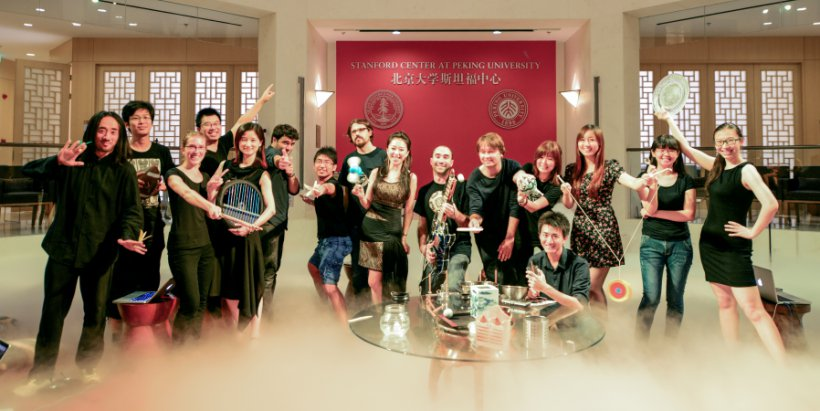招生|斯坦福中心暑期研究生班

招生|斯坦福中心暑期研究生班
中國大科學(xué):粒子物理學(xué)與宇宙學(xué)的前沿
日期:2017年7月3日-21日
地點(diǎn):北京大學(xué)斯坦福中心(中國北京)
導(dǎo)師:斯坦福大學(xué)物理系郭兆林教授
報(bào)名資質(zhì):成績優(yōu)異的在讀生,,研究生優(yōu)先
費(fèi)用:課程費(fèi)用由斯坦福中心贊助,。機(jī)票、食宿由學(xué)生自己安排并支付,。
課程介紹
基礎(chǔ)物理學(xué)是研究基本粒子、空間,、宇宙起源等最深邃的自然本質(zhì)的學(xué)科,,這些研究領(lǐng)域的進(jìn)展一步步向我們揭示出了一個(gè)遠(yuǎn)超人類想象的現(xiàn)實(shí)世界。未來基礎(chǔ)物理的發(fā)展將引起所有國家的濃厚興趣---包括那些有不同文化背景和政治觀點(diǎn)的國家,。本次研討班我們將探討基礎(chǔ)物理學(xué)的前沿研究以及其對社會的關(guān)系,。
雖然人們普遍把基礎(chǔ)物理學(xué)的研究工作看做人類最崇高的追求之一,但由于其高昂的成本,,過去的大型基礎(chǔ)物理實(shí)驗(yàn)項(xiàng)目主要由歐洲,、日本、美國等發(fā)達(dá)地區(qū)和國家開展,。如今中國已經(jīng)發(fā)展為世界第二大經(jīng)濟(jì)體,,建造大型粒子對撞機(jī)、開展空間引力波實(shí)驗(yàn)等粒子物理學(xué)和宇宙學(xué)的宏偉計(jì)劃被提上了日程,,但同時(shí)也引發(fā)了人們的探討:中國真正準(zhǔn)備好開展這些宏大的科學(xué)項(xiàng)目了嗎,?這些項(xiàng)目的回報(bào)能否匹配其天價(jià)的費(fèi)用開支?本次暑期班我們將針對這些問題開展研究,。
學(xué)習(xí)目標(biāo)
本次課程的學(xué)習(xí)目標(biāo)是:
1,、概念上掌握對前沿粒子物理學(xué)和宇宙學(xué)的概觀;
2,、以中國為例,,事實(shí)核查并系統(tǒng)地分析國內(nèi)對大型科研項(xiàng)目的支持方和反對方的觀點(diǎn)。
北京有北京大學(xué)科維里天文與天體物理研究所,、高能物理研究所,、中國國家天文臺、清華大學(xué)等領(lǐng)域內(nèi)的頂尖科研機(jī)構(gòu),,北京大學(xué)斯坦福中心為我們提供了理想的研討地點(diǎn)以及訪問這些頂尖科研機(jī)構(gòu)的便捷機(jī)會,。
課程安排
本次課程為期三周,課程主要由導(dǎo)師授課,、嘉賓客座講演以及學(xué)生講演組成,。
第一周:粒子物理學(xué)與宇宙學(xué)概覽。第一周的課程內(nèi)容是郭兆林教授于2016年秋季在斯坦福大學(xué)所授PHY18N課程的精簡版,,其中將包括宇宙學(xué),、粒子物理學(xué)以及引力波天文學(xué)。
第二周:客座嘉賓講演與討論,。第二周的課程內(nèi)容將涉及大型粒子對撞機(jī),、空間引力波探索、FAST(500米口徑球面射電望遠(yuǎn)鏡探索引力波),、中國錦屏地下實(shí)驗(yàn)室(暗物質(zhì)探索)以及Ali-CMB(宇宙微波背景輻射實(shí)驗(yàn)),。條件允許的情況下,,我們將參訪中國高能物理研究所、國家天文臺等研究機(jī)構(gòu),。
第三周:事實(shí)核查,;分析并歸納論據(jù);總結(jié)與結(jié)業(yè)演講,。
申請流程
請郵件至[email protected]咨詢申請相關(guān)事宜,。課程官網(wǎng):http://scpku.fsi.stanford.edu/docs/scpku-graduate-seminar-program
Big Science in China:
Frontiers in Particle Physics and Cosmology
Course title: Big Science in China: Frontiers in Particle Physics and Cosmology
Date: July 3, 2017 - July 21, 2017
Location: Stanford Center at Peking University, Beijing, China
Instructor: Associate Professor Chao-Lin Kuo, Department of Physics, Stanford University
Eligibility: Enrolled students in good academic standing. Graduate students will be given priority.
Overview
Fundamental physics is the discipline that studies the deepest mysteries of nature: elementary particles, space time and the origin of the universe. Progress on these subjects has already revealed a reality far beyond naïve human imagination. Future developments should be of tremendous interest to all nations, including ones with vastly different cultural backgrounds or political views. In this graduate seminar, we will discuss research in frontiers of fundamental physics and its relation to society.
While it is widely agreed that fundamental physics research is one of the noblest pursuits of mankind, big experimental projects have been historically done in the Europe, Japan, and the US because of their high cost. Now that China has become the world's second largest economy, ambitious programs in particle physics and cosmology — such as the 100-TeV super particle collider and space-based gravitational wave experiments — have been proposed. This has stimulated an important discussion: Is China ready to embark on mega science projects while there are still obvious challenges in the country? Can the potential returns justify the large price tags? We will comprehensively study these issues in this course.
The instructor Professor Chao-Lin Kuo is an experimental physicist searching for imprints of Big Bang from the South Pole, western Tibet, and space. Although this is a course that focuses on science policies, students with good knowledge on non-calculus based physics are better prepared to appreciate all aspects of the issues.
Learning Goals
The goals of this course are: (1) to provide a conceptual overview of the frontiers of particle physics and cosmology; (2) to fact-check and systematically analyze the pros and cons presented by supporters and objectors of big science projects, with China as a case study.
Peking University is the host institute of KIAA (Kavli Institute of Astronomy and Astrophysics). Beijing is also home to Institute of High Energy Physics, National Astronomical Observatories of China, Tsinghua University, which are the lead institutes of many of the large physics/cosmology projects. SCPKU provides the perfect setting to have a serious conversation about big science in China and frontiers of particle physics and cosmology, with plenty of opportunities for lab tours and guest lectures.
Seminar Schedule
This is a three-week long seminar course consisting of lectures on the subject matter, guest talks, and student presentations.
Week 1: Overview of particle physics and cosmology. The format is a condensed version of PHY18N taught by the instructor at Stanford University in autumn 2016. We will cover topics in cosmology, particle physics, and gravitational-wave astronomy.
Week 2: Guest lectures followed by discussions; the subjects will include 100-TeV collider, space-based gravitational wave probes, FAST (300m radio telescope searching for gravitational waves), Jingping Underground facilities (dark matter searches), and Ali-CMB (cosmic microwave background experiment in Tibet). If possible, we will arrange visits to Institute of High Energy Physics, National Astronomical Observatories of China, and other labs.
Week 3: Fact-checking; analysis and synthesis of the arguments; summary and presentations.
Application Process
Please write to [email protected] for application instructions. You may visit the seminar’s official website at:
http://scpku.fsi.stanford.edu/docs/scpku-graduate-seminar-program